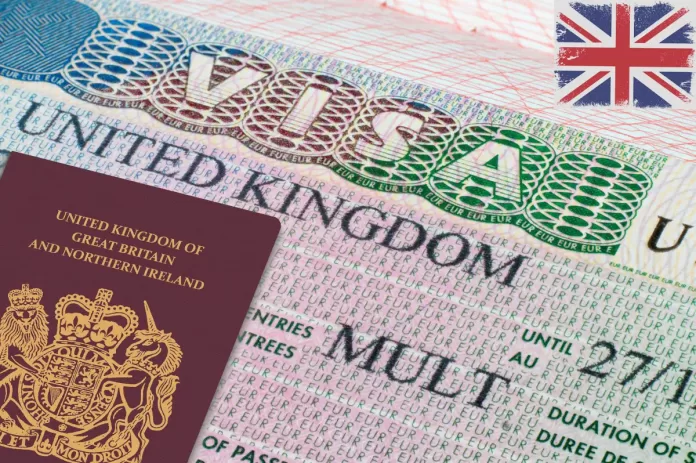The United Kingdom government has updated financial requirements for individuals applying for student, tourist, or work visas in 2025.
According to a statement on the UK government website, the financial guidelines for 2025 were revised to reflect the country’s economic conditions, with significant changes in living cost requirements and visa application fees.
Applicants will need to plan accordingly to meet the updated financial conditions when applying for various visa categories, including student, work, and family visas.
Some of the key changes for 2025 include higher living cost requirements for student visas (e.g., from £1,334 to £1,400 per month in London), increased application fees for most visa categories, and more rigorous assessments of financial documentation for tourists.
Applicants planning to study in London must show a minimum of £1,400 per month for living expenses, up from £1,334 in 2024.
Those studying outside London will need to demonstrate £1,100 per month, up from £1,023. The funds are required to cover living costs for up to nine months.
In addition to proving the ability to cover living costs for up to 9 months, students must also show they have enough funds to pay for their first year’s course fees. This ensures that students are financially prepared for both tuition and daily expenses.
This amount must be shown in a bank statement, which must cover a consecutive 28-day period and not be older than 31 days from the visa application date.
Furthermore, Visa application fees for 2025 have also experienced a slight increase across several categories.
The fee for a standard student visa for those outside the UK has risen from £490 to £510, while the fee for a visit visa for stays of up to six months has increased from £115 to £120.
Longer-term visit visa fees have also increased with the two-year visa now costing £420, up from £400 in 2024, while the Longer-term visit visa fees for five years have been increased to £990 from £963.
Other categories, such as the priority visa service which is now £550, and the Super Priority Visa Service now at £1,050 both experiencing an increase of £50.
The UK government has set more detailed financial requirements for visitors applying for tourist visas in 2025.
READ ALSO: US Embassy Issues New Directive For Nigerian Visa Applicants
Although no fixed amount will be required, applicants must demonstrate that they have enough funds to cover their trip, including accommodation, transport, and daily expenses, the statement noted
For extended stays, visa officials will scrutinize applicants’ financial documentation more thoroughly.
Requirements vary by visa type for work visas as Skilled Worker Visa applicants must show £1,270 to support themselves unless their employer provides certification of financial support.
Applicants for the Global Talent Visa do not have specific financial requirements but must prove they can cover initial living expenses, Health and Care Worker Visa applicants are exempt from minimum financial requirements if their employer provides sponsorship.
For family visas, clearer income guidelines now require a minimum combined income of £29,000 for partners and spouses, with new exemptions for applicants who qualify under specific disability or career benefits. Partners and spouses applying for a family visa must now demonstrate a combined annual income of at least £29,000 in 2025.
Applicants may be exempt from this requirement if they or their partner receive certain disability or carer benefits.
For children, the requirement is an additional £3,800 per year for the first child and £2,400 for each additional child.
The statement on the website also noted that applicants are permitted to utilize their savings to satisfy the financial criteria, as long as they adhere to particular documentation guidelines.
Individuals who do not meet the income requirement may still be eligible for a visa under specific circumstances, such as having a British or Irish child residing in the UK or if rejecting the application would violate human rights.
Changes Made for 2025 in Comparison to 2024
Here is a side-by-side comparison of the changes in UK visa financial requirements for 2025 vs. 2024 presented in an organized table:
| Category of Expenses | 2024 | 2025 | Change |
|---|---|---|---|
| Student Visa – Living Costs | |||
| London (per month) | £1,334 | £1,400 | +£66 |
| Outside London (per month) | £1,023 | £1,100 | +£77 |
| Visa Application Fees | |||
| Student Visa (Outside UK) | £490 | £510 | +£20 |
| Visit Visa (Up to 6 months) | £115 | £120 | +£5 |
| Long-term Visit Visa (2 years) | £400 | £420 | +£20 |
| Long-term Visit Visa (5 years) | £771 | £810 | +£39 |
| Long-term Visit Visa (10 years) | £963 | £990 | +£27 |
| Optional Premium Services | |||
| Priority Visa Service | £500 | £550 | +£50 |
| Super Priority Visa Service | Up to £1,000 | Up to £1,050 | +£50 |
| Dependents’ Financial Requirements | Less defined | Clearer guidelines introduced | Improved clarity |
| Digital Submission | Limited | Enhanced online portal | More streamlined process |
UK Visa Visa Application Processing Fee Charges in 2025
The visa application fees for 2025 have been adjusted slightly to align with inflation and service upgrades:
| Category Of UK VIsa | Visa Type (Long, Short, Med, Etc) | Fee (USD) |
|---|---|---|
| Visit | Short-term (6 months, single or multiple entry) | $153 |
| Longer-term (up to 2 years) | $573 | |
| Longer-term (up to 5 years) | $1023 | |
| Longer-term (up to 10 years) | $1277 | |
| Visiting academic (6–12 months) | $265 | |
| Marriage visitor visa | $153 | |
| Private medical treatment (6–11 months) | $265 | |
| Chinese tour group visit | $153 | |
| Study | Short-term English study (6–11 months) | $265 |
| Transit | Direct Airside Transit (DATV) | $46 |
| Visitor in Transit visa | $85 | |
| Crew member joining ship or aircraft | $85 | |
| Parent of Student Child Visa | Parent of a Student child (up to 12 months) | $845 |
| Child Visitor | Short-term (6 months, single or multiple entry) | $153 |
| Longer-term (up to 2 years) | $573 | |
| Longer-term (up to 5 years) | $1023 | |
| Longer-term (up to 10 years) | $1277 |
Financial Requirements for UK Family Visas in 2025
| Category Of Expense (2025) | Details of Expenses |
|---|---|
| Minimum Income Requirement | Applicants applying as a partner or spouse must show a combined annual income of £29,000 to meet the financial threshold. |
| Exemptions to Minimum Income | – Partner receives certain disability or carer benefits (e.g., PIP, Attendance Allowance, Armed Forces Independence Payment). |
| – First application as a partner was before 11 April 2024, and the visa is being extended. | |
| Disability or Carer Benefits Exempting Income Requirements | – Disability Living Allowance – Severe Disablement Allowance – Industrial Injuries Disablement Benefit – Attendance Allowance – Carer’s Allowance |
| – Personal Independence Payment (PIP) – Armed Forces Independence Payment – Police Injury Pension. |
|
| Additional Income for Children | – £3,800 per year for the first child. – £2,400 per year for each additional child after the first. |
| Income Cap for Children | If total income for children exceeds £29,000, applicants only need to prove they meet the £29,000 cap. |
| Excluded Children from Income Requirements | – Children who are British or Irish citizens. – Children with pre-settled status or permanent residency in the UK. |
| – EU/EEA citizens without pre-settled status may be partially exempt (refer to Appendix FM). | |
| Using Savings to Meet Financial Requirements | Applicants can use their savings instead of income to meet financial thresholds. Documentation must comply with Appendix FM guidelines. |
| Failing to Meet Financial Requirements | Applicants may still qualify if: – They have a child in the UK who is a British or Irish citizen or has lived in the UK for 7 years. |
| – Denying the application would breach the applicant’s human rights. | |
| – Settlement may be possible after 10 years of residence in the UK if financial requirements cannot be met. | |
| Required Evidence and Documentation | – Bank statements or savings certificates. – Employer letters or proof of income. – Documentation proving dependents’ status (e.g., birth certificates). |


